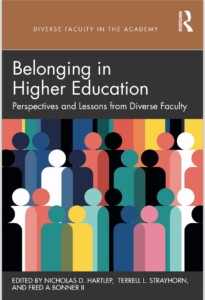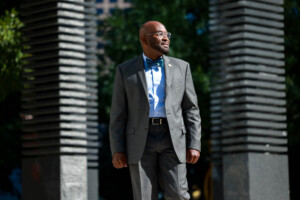PRAIRIE VIEW, Texas (April 4, 2024) – In today’s rapidly evolving academic landscape, discussions surrounding the diverse fabric of higher education have grown to encompass a variety of crucial elements, such as curriculum development, research methodologies and student support services. Among these, the concept of “belonging” emerges as a fundamental yet often overlooked aspect.
 For faculty members and students, how do they know they “belong” in a university community? Factors could be feeling connected and comfortable, being supported and included for who they are as a person, including their cultural background and ethnicity. It could also mean having their voices heard without being dampened by status quo policies and procedures.
For faculty members and students, how do they know they “belong” in a university community? Factors could be feeling connected and comfortable, being supported and included for who they are as a person, including their cultural background and ethnicity. It could also mean having their voices heard without being dampened by status quo policies and procedures.
Dr. Fred A. Bonner II, professor and endowed chair of Educational Leadership and Counseling in Prairie View A&M University’s Whitlowe R. Green College of Education, is a co-editor of the upcoming book “Belonging in Higher Education: Perspectives and Lessons from Diverse Faculty.” The book seeks to address diversity in academia through autoethnographic stories—personal narratives that blend autobiography with ethnography, offering insights into individuals’ experiences within broader cultural and social contexts.
About the Book
Published by Routledge, the collection offers narratives from 20 contributors of different ethnic backgrounds, including African American (Part 1), Asian American (Part 2), Latinx American (Part 3), Indigenous American (Part 4), and BIPOC individuals (Part 5), working in diverse roles within academia.
These stories dive into experiences across different institutional settings, offering insights into what it takes to foster deeper connections in higher education communities.
“I hope that readers will take away pearls of wisdom that are shared in authentic ways about the negotiations that diverse faculty, who, like them, make to not only survive but thrive in contexts like colleges and universities,” said Dr. Bonner, who is also Founding Executive Director and Chief Scientist of the Minority Achievement, Creativity and High-Ability (MACH-III) Center at PVAMU.
With its celebration of diverse experiences and practical insights, this volume is useful for researchers, faculty, administrators and students across multiple disciplines, providing crucial perspectives for shaping policies that prioritize belonging for diverse faculty members.
Life in Stories
Discussing the book’s contribution to the ongoing conversation about diversity in higher education, Dr. Bonner explored the concept of “orthogonal thinking” and its role in developing and shaping new narratives within higher education communities.
“This book provides space for orthogonal thinking and allows for the reader to draw key insights through autoethnographic narratives,” said Dr. Bonner. “Orthogonal thinking draws from a variety of, and perhaps seemingly unrelated, perspectives to achieve new insights. It is the momentary blurring of boundaries to see what might emerge. So, for this specific project, each faculty contributor brought their unique perspective on what belonging meant, how it was defined, and when and in which critical ways it influenced their autoethnographic narrative.”
Exploring the narratives within the book further, Dr. Bonner shed light on the real-world perspectives shared by contributors. These narratives act as powerful gateways, connecting storytelling with lived experiences and offering profound insights into the concept of belonging within academia.
“The counter/narratives in the book provide seamless perspectives on how belonging is experienced by diverse faculty in deep and meaningful ways—by seamless, the authors are the narrative instruments; therefore, there is not a disconnection between narrative and lived experience.”
One of the challenges faced during the editing process involved unifying voices and stories of inclusion to create a common narrative for the key theme of the book. The three editors engaged in hours of dialogue, exchanging stories of what it means to be a person of color in today’s higher education communities.
“As three men of color, we each had to navigate Academe to find our own sense of belonging,” said Dr. Bonner. “The book serves as a crucible in which key elements, i.e., multiple voices, are articulated through myriad autoethnographic narrative accounts. A key challenge was to take those multiple voices and center their narratives on belonging.”
Transforming Campuses
Discussing the potential impact on policy and practices in higher education, Dr. Bonner envisions the book serving as a catalyst for recognizing and addressing the unique experiences of diverse faculty members.
“I see this book serving as a window to the experiences of diverse faculty who often go overlooked or whose experiences are somehow perceived to be the ‘same’ as their white counterparts,” he said.
As part of the “Diverse Faculty in the Academy” series by Routledge, Dr. Bonner sees “Belonging in Higher Education” as a critical component that promises to provide a platform for diverse voices and experiences within academia, reminding us of the importance of belonging when fostering a truly inclusive academic environment.
Through “Belonging in Higher Education,” readers are invited to explore the nuanced experiences of diverse faculty members and gain valuable insights that go beyond traditional diversity discourse and arrive at the shores of a new, exciting landscape created by the people who truly understand the complexities of academia, where diversity flourishes, and inclusion sets sail on uncharted waters.
By centering narratives on belonging, this book has the potential to not only influence policy and practices but also spark meaningful dialogue and pave the way for a more inclusive future in academia.
“Belonging in Higher Education” will be available for pre-order from Routledge publishing on June 14, 2024.
By Kerry Laird
-PVAMU-

